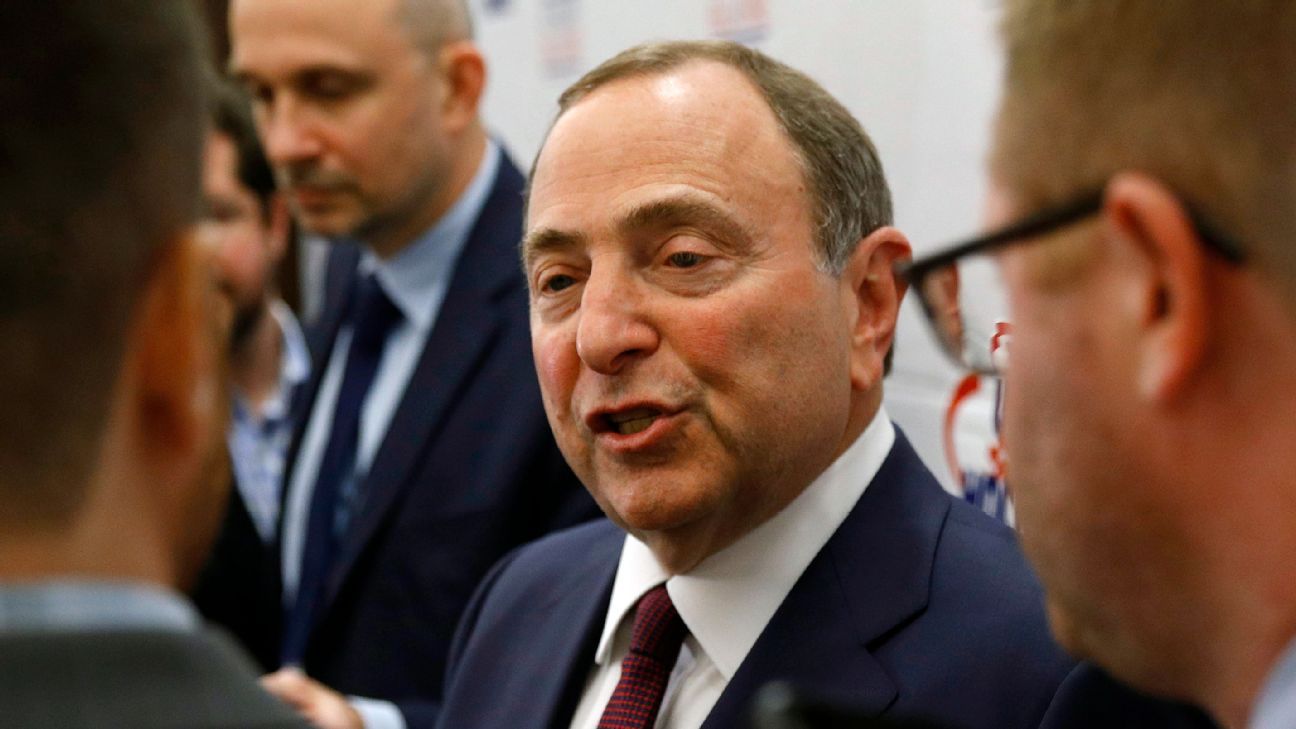MANALAPAN, Fla. — NHL commissioner Gary Bettman downplayed the league’s appetite for implementing a postseason salary cap, saying he doesn’t consider teams’ usage of long-term injury reserve a “front-burner issue.”
“Nobody in that room [of NHL general managers] believes that it’s being abused,” Bettman said Tuesday as the league’s annual spring general managers meetings wrapped up. “I think it’s the perception. Nobody was sitting there saying, ‘this is a terrible abuse, we have to fix it.’ That hasn’t been the case at all.”
Manipulation of the salary cap has become a buzzy topic around the NHL and landed on the agenda of this week’s meetings. According to a source, the GMs had a discussion about erasing the LTIR loophole that allows teams to build non-salary complaint rosters in the regular season by stashing high-budget salaries on long-term injury reserve, but the conversation was ultimately tabled to the next GM meetings, this July at the draft in Montreal.
“There are definitely varying opinions on this one,” one GM told ESPN. “But not necessarily a charge for reform. Probably more of a media thing right now.”
Any change to the collective bargaining agreement also requires approval from the NHLPA. Bettman said the NHL has engaged in conversations with the players’ association on the matter, but didn’t divulge much more than that.
“I believe, overwhelmingly, the view of the general managers is that this hasn’t been a problem for the last 17 years,” Bettman said. “This is something that would be nice to adjust to change the perception, but I don’t think it’s viewed that it’s been a problem, because it hasn’t.”
A few recent examples have fueled the perception of competitive imbalance. Tampa Bay Lightning star Nikita Kucherov spent all of last regular season on long-term injury reserve after undergoing hip surgery, meaning his $9.5 million salary didn’t count against the cap. The Lightning finished the regular season with a cap hit of more than $98 million, per Cap Friendly — despite the salary cap being $81.5 million. Kucherov was activated for Game 1 of the playoffs and helped lead the Lightning to their second-straight Cup.
A similar situation played out with Patrick Kane and the Blackhawks in 2015, allowing Chicago to be buyers at the trade deadline and exceed the cap. This season, many teams have pointed fingers at Vegas, which placed captain Mark Stone on LTIR just as it was activating Jack Eichel. According to CapFriendly, the Golden Knights have a projected cap hit of $92.5 million, thanks to Stone ($9.5 million salary) and Reilly Smith ($5 million) both on LTIR. Though Vegas will have trouble clearing both players for the regular season, they could be eligible for the playoffs.
Asked explicitly if he was satisfied with how Vegas is handling its LTIR space, Bettman said: “Based on what I know about it to this point, yes.”
“I was thinking about the question and the way I was going to be scrutinized, so I wanted to make sure there was no ambiguity,” Bettman said.
Also at this week’s meetings, general managers were told the salary cap is expected to rise $1 million to $82.5 million for the 2022-23 season as league revenue is on target to be over $5 billion this season. Bettman also said that the $1 billion in debt the players owe the owners — from revenue lost during the pandemic — is expected to be repaid by the 2024-25 season.
Bettman also said the league is working on an agreement with the NHLPA to create a database for players’ no-trade lists to be filed with Central Registry. That should help avoid a situation like the one that unfolded with Golden Knights forward Evgeni Dadonov last week. Dadonov was traded to Anaheim despite the Ducks being on his 10-team no trade list. The NHL ultimately voided the deal after realizing Central Registry did not have an updated list.
The GMs also were given a progress report on the World Cup of Hockey. The NHL and NHLPA have been in planning meetings over bringing back the event for 2024. Bettman said the hope is to go back to a more traditional format of countries versus countries — though they haven’t decided which countries will be participating, and if Russia is allowed.
Bettman did say the league doesn’t anticipate putting any restrictions on Russian players for the 2022 NHL draft.
